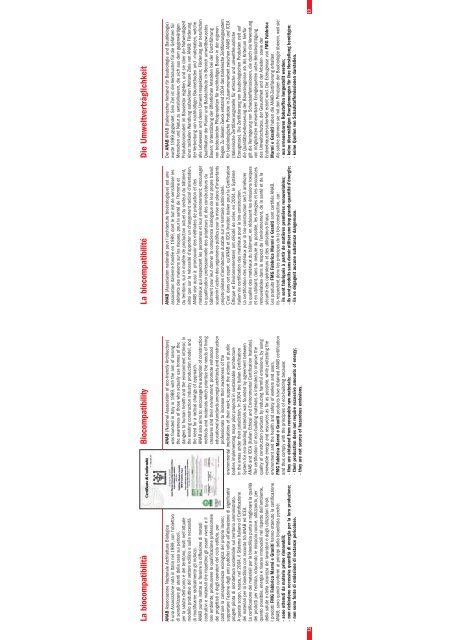NATURAL STONE BUILDERS - FMG Fabbrica Marmi e Graniti
NATURAL STONE BUILDERS - FMG Fabbrica Marmi e Graniti
NATURAL STONE BUILDERS - FMG Fabbrica Marmi e Graniti
You also want an ePaper? Increase the reach of your titles
YUMPU automatically turns print PDFs into web optimized ePapers that Google loves.
La biocompatibilità Biocompatibility La biocompatibilité Die Umweltverträglichkeit<br />
Der ANAB ANAB (Italienischer Verband für Baubiologie und Bauökologie)<br />
wurde 1989 gegründet. Sein Ziel ist die Verbraucher für die Gefahren für<br />
Menschen und Natur zu sensibilisieren, die sich aus dem gegenwärtigen<br />
Produktionsmodell im Bausektor ergeben, und sie über die Notwendigkeit<br />
einer radikalen Wandlung aufzuklären Weitere Ziele von ANAB: Förderung<br />
der Verbreitung von nachhaltigen Baumethoden und –materialien, welche<br />
alle Lebewesen und deren Umwelt respektieren; Förderung der beruflichen<br />
Qualifikation der Planer und Baufachleute im Bereich umweltbewusstes<br />
Bauen; Unterstützung der öffentlichen Anstalten bei der Durchführung<br />
von bedeutenden Pilotprojekten für nachhaltiges Bauen in der eigenen<br />
Region. Zu diesem Zweck entstand 2004 das Italienische Zertifizierungssystem<br />
für baubiologische Produkte in Zusammenarbeit zwischen ANAB und ICEA<br />
(Italienische Zertifizierungsstelle für ethische und umweltfreundliche<br />
Erzeugnisse). Die Zertifizierung von baubiologischen Produkten zielt auf<br />
die Qualitätsverbesserung der Bauerzeugnisse ab. Als Kriterium hierfür<br />
gilt die Verringerung von Schadstoffemissionen, die durch die Verwendung<br />
von möglichsten erneuerbaren Energiequellen unter Berücksichtigung<br />
des Umweltschutzes, der Gesundheit und der Arbeiter- sowie der<br />
Endverbrauchersicherheit erzielt wird. Die Erzeugnisse von <strong>FMG</strong> <strong>Fabbrica</strong><br />
<strong>Marmi</strong> e <strong>Graniti</strong> haben die ANAB-Zertifizierung erhalten.<br />
Als solche stimmen sie mit den Prinzipien der Baubiologie überein, weil sie:<br />
- aus erneuerbaren Rohstoffen hergestellt werden;<br />
- keine übermäßigen Energiemengen für ihre Herstellung benötigen;<br />
- keine Quellen von Schadstoffemissionen darstellen.<br />
ANAB (Association nationale pour l’architecture bioécologique) est une<br />
association italienne fondée en 1989, dont le but est de sensibiliser les<br />
habitants des maisons sur les risques, pour la santé de l’homme et<br />
du territoire, sur le modèle de production actuel du secteur du bâtiment,<br />
ainsi que sur la nécessité d’apporter un changement radical d’orientation.<br />
ANAB vise aussi à: promouvoir des méthodes de production et des<br />
matériaux qui respectent les personnes et leur environnement; encourager<br />
la qualification professionnelle des projeteurs et des constructeurs du<br />
bâtiment pour leur donner la conscience écologique de leur propre travail;<br />
soutenir l’action des organismes publics pour la mise en place d’importants<br />
projets-pilotes d’architecture durable sur le territoire administré.<br />
C’est dans cet esprit qu’ANAB et ICEA (Institut italien pour la Certification<br />
Éthique et Environnementale) ont décidé de créer, en 2004, le Système<br />
italien de certification des matériaux pour la bio-construction.<br />
La certification des matériaux pour la bio-construction sert à améliorer<br />
la qualité des matériaux du bâtiment, en réduisant les émissions toxiques<br />
et en utilisant, dans la mesure du possible, les énergies et les ressources<br />
renouvelables dans le respect de l’environnement, de la santé et de la<br />
sécurité des opérateurs et des utilisateurs finaux.<br />
Les produits <strong>FMG</strong> <strong>Fabbrica</strong> <strong>Marmi</strong> e <strong>Graniti</strong> sont certifiés ANAB.<br />
Ils respectent donc les principes de la bio-construction, car:<br />
- ils sont fabriqués à partir de matières premières renouvelables;<br />
- ils sont produits sans devoir utiliser une trop grande quantité d’énergie;<br />
- ils ne dégagent aucune substance dangereuse.<br />
ANAB (National Association of eco-friendly Architecture)<br />
was founded in Italy in 1989, with the aim of raising<br />
the awareness of those who actually use homes of the<br />
dangers to human health and the environment intrinsic in<br />
the existing construction industry production model, and<br />
the need for a radical change of approach.<br />
ANAB also aims to: encourage the adoption of construction<br />
methods and materials which prioritize the needs of living<br />
creatures and their environment; promote enhanced<br />
educational standards amongst architects and construction<br />
professionals to increase their awareness of the<br />
environmental implications of their work; support the actions of public<br />
bodies implementing major pilot projects in sustainable architecture<br />
in the areas under their jurisdiction. In 2004 the Italian Certification<br />
System for eco-building materials was founded by agreement between<br />
ANAB and ICEA (Italian Ethical and Environmental Certification Institute).<br />
The certification of eco-building materials is intended to improve the<br />
quality of construction products by reducing harmful emissions, by using<br />
renewable energy and resources as far as possible, while protecting the<br />
environment and the health and safety of workers and users.<br />
<strong>FMG</strong> <strong>Fabbrica</strong> <strong>Marmi</strong> e <strong>Graniti</strong> products have obtained ANAB certification<br />
and thus comply with the principles of eco-building because:<br />
- they are obtained from renewable raw materials;<br />
- their production does not require excessive amounts of energy;<br />
- they are not source of hazardous emissions.<br />
ANAB Associazione Nazionale Architettura Biologica<br />
è una Associazione nata in Italia nel 1989, con l’obiettivo<br />
di sensibilizzare gli utenti della casa sui pericoli,<br />
per la salute dell’uomo e del territorio, insiti nell’attuale<br />
modello produttivo del settore edilizio e sulla necessità<br />
di modificarne radicalmente gli indirizzi.<br />
ANAB punta inoltre a: favorire la diffusione di metodi<br />
costruttivi e materiali che rispettino gli esseri viventi e il<br />
loro ambiente; promuovere la qualificazione professionale<br />
dei progettisti e degli operatori del ciclo edilizio, per<br />
costruire la consapevolezza ecologica del proprio lavoro;<br />
supportare l’azione degli enti pubblici volta all’attivazione di significativi<br />
progetti pilota di architettura sostenibile sul territorio amministrato.<br />
A questo scopo, nasce, nel 2004, il Sistema Italiano di Certificazione<br />
dei materiali per la bioedilizia con accordo tra ANAB ed ICEA.<br />
La certificazione dei materiali per la bioedilizia punta a migliorare la qualità<br />
dei prodotti per l’edilizia, riducendo le missioni nocive, utilizzando, per<br />
quanto possibile, energia e risorse rinnovabili nel rispetto dell’ambiente,<br />
della salute e della sicurezza dei lavoratori e degli utilizzatori finali.<br />
I prodotti <strong>FMG</strong> <strong>Fabbrica</strong> <strong>Marmi</strong> e <strong>Graniti</strong> hanno ottenuto la certificazione<br />
ANAB; sono quindi conformi ai principi della bioedilizia perché:<br />
- sono ottenuti da materie prime rinnovabili;<br />
- non richiedono eccessiva quantità di energia per la loro produzione;<br />
- non sono fonte di emissione di sostanze pericolose.<br />
12 13




